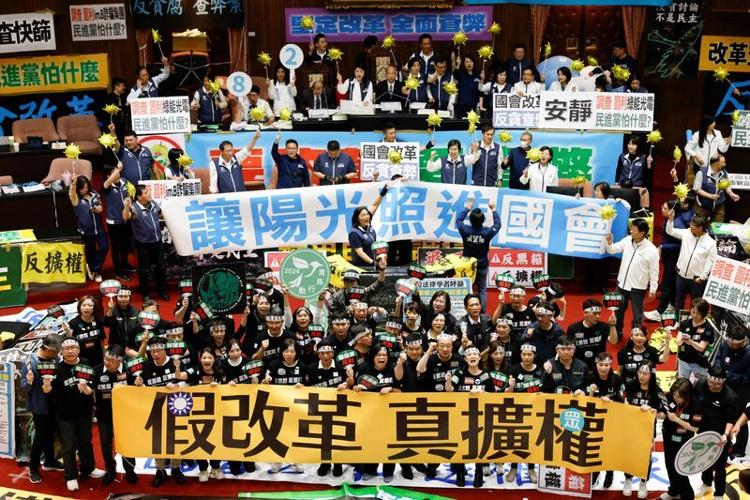Taiwan’s opposition-controlled parliament has passed a controversial reform bill amid intense debate and physical altercations between lawmakers, as well as massive protests from citizens. The bill, which aims to expand the legislature’s power to summon and interrogate officials, military personnel, and civilians, was approved with 58 votes in favor and 45 against during a third reading on Tuesday evening in Taipei.
The two major opposition parties, the Kuomintang (KMT) and the Taiwan People’s Party (TPP), spearheaded the bills, which have been criticized by the ruling Democratic Progressive Party (DPP) for attempting to weaken President Lai Ching-te’s power. The DPP, which won the presidency in January with Lai’s formal inauguration last Monday, has accused the opposition of subverting Taiwan’s democratic processes to rush the bill throug.
The bill passed despite violent clashes between opposing legislators, which resulted in at least two MPs being hospitalized. The parliamentary proceedings were marked by confrontations, with the DPP and its supporters alleging that the opposition was attempting to undermine Lai’s presidency through these reforms.
.Proponents of the bill argue that legislative reform is necessary for increased accountability and maintain that the bills are not significantly different from some the DPP attempted to introduce when they held a legislative majority. However, critics contend that the bills go beyond the DPP’s attempts and are ambiguously defined, potentially allowing for the harassment of political opponents and the disruption of Lai’s administration.
The bill also includes provisions allowing officials under questioning to be fined for providing false statements or engaging in ‘reverse-questioning,’ a term critics claimed was undefined and infringed upon free speech. The Taiwan Bar Association had previously criticized the opposition parties for failing to substantively discuss or review the bills before pushing them through. Outside the Legislative Yuan in Taipei, tens of thousands of people protested against the bills for the third time in a week. The largest crowd, estimated to be between 50,000 and 100,000 people, gathered on Friday. The protests have grown more organized with each showing, featuring crowd control measures, medical care, food and water, and garbage collection.
The protests represent the largest display of civil disobedience in Taiwan since the 2014 Sunflower Movement. Many protesters drew inspiration from that time and expressed their intention to continue protesting against what they perceived as undemocratic behavior by the opposition. Lai offered his support to the previous night’s protests, stating, “The power of Taiwan’s civil society is in full display. The deliberations of the legislative yuan should abide by procedural justice.” He accused the opposition of “forcing votes through a majority and depriving the legislative yuan of the bill’s due discussion” The passage of the bill sets the stage for a high-stakes confrontation with President Lai’s government, protesters, and potentially the courts. The opposition parties have seized legislative control with a slim majority following January elections, while the presidency went to Lai. The DPP argues that the reforms were rammed through without adequate consultation and that their ambiguity or overreach of power is a cause for concern.
In response to the bill’s passage, DPP lawmakers hung banners around parliament’s main chamber that read “oppose expanding power, support Taiwan,” while party lawmakers threw paper planes at the KMT during Tuesday’s lengthy session. The opposition, on the other hand, celebrated with small sun-shaped balloons after the bill’s passage.
The controversy surrounding the bill has also drawn international attention, with critics arguing that the legislation is vague and lacks the checks and balances necessary to prevent abuse. The bill also hands the legislature the power to control budgets, including defense spending, and demand information disclosure from the military, private corporations, or individuals deemed relevant by parliamentarians.
The opposition parties, which advocate for reunification with China, have been accused of undermining Taiwan’s democracy by expanding the legislature’s influence over the executive branch. The DPP argues that the reforms are a step towards weakening Taiwan’s sovereignty and independence, which is threatened by China’s consistent military presence and diplomatic pressure.
The passage of the bill has significant implications for Taiwan’s political landscape, as it sets the stage for a high-stakes confrontation between the government and the opposition. The controversy highlights the deep divisions within Taiwan’s political system and the ongoing struggle for power and influence between the ruling DPP and the opposition parties.

